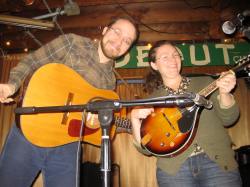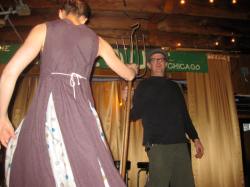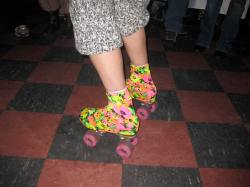
Lori RotenberkThey sing, they dance, they grow what’s for supper.
Here on this small stage in a shanty of a bar called the Hideout in Chicago’s Wicker Park neighborhood, where Jack White once shook the night in flame-red pants, the Band of Farmers is about to strut its stuff. And we’re not talking produce.
Clad in everything from overalls to mustard yellow rain suits, a procession of characters mounts the stage, plucking guitars, strumming mandolins, and twirling pitchforks. There’s even a reading by a “beet poet.” They work the crowd into hoots of “yeehaw!” Some in the audience wave jars of apple butter in one hand, craft brews in the other. From the stage a voice bellows, “God, this is an episode out of Portlandia!”
Welcome to the first annual Farmer’s Talent Show, a hodgepodge of acts by nine Chicago-area organic producers. They created the show as a way to market community-supported agriculture operations, or CSAs. CSA farmers sell seasonal “shares” of their products, often before planting season. The early infusion of revenue gives them funds to buy items such as tools, seeds, and other equipment for the coming season. Customers, in return, receive weekly or bimonthly boxes of freshly harvested produce that are delivered to drop-off places or right to their doorsteps.
The lure of a CSA has always been the bond it forms between farmer and customer. Founded in Japan, Germany, and Switzerland in the 1960s as cooperatives funding farmers growing healthy food, CSAs were brought to the U.S. in the late ’80s, and soon gained popularity. Some CSAs have moved beyond produce, offering fruit, meat, poultry, eggs, flowers, and even honey and fresh-baked bread — sometimes all in one box.
But sales for many CSAs have declined in recent years, due in part to a bumpy economy, but also because more farmers markets and grocery stores that offer a growing selection of natural foods have made for an increasingly competitive marketplace. The rise of the not-necessarily-local “produce in a box” model has also helped muddle choices for consumers.

Lori RotenberkMom said not to run with scissors. She didn’t say anything about dancing with pitchforks.
In response, farmers have had to get creative — and no place more so than in Chicago. Julia McDonald says she came up with the idea of the talent and fashion show as a way to further connect with potential customers while forming a marketing coalition with other area farmers. Julia and her husband, Todd, farm the 20-acre Peasants’ Plot near Kankakee, Ill. Tonight, wielding pitchfork and rake, they perform an “interpretive” dance to the Pogues song “I’m a man you don’t meet everyday.”
Also in the lineup, Alison Parker of Radical Root Farm sings in a Patti Smith vibrato that we should “join a CSA, we won’t be mad, make the best meals you ever had …” And in a stunning piece of performance art, a deeply eye-shadowed Jody Osmund of Cedar Valley Sustainable Farm sits at a humming Singer sewing machine and makes a bag out of a T-shirt while Tim Minchin’s video “Canvas Bag” plays on a huge screen. Finished, he whips the bag from under the needle, prancing the stage, the audience dancing and wildly chanting, “Take Your Canvas! Bags! to the Supermarket!”
Osmond, who offered the state’s first meat CSA, says community-supported ag operations offer better rates and longer seasons than farmers markets that open and close on set dates. Farmers enhance the one-on-one experience by offering farm tours, seasonal dinners, and newsletters and blogs containing preparation methods and recipes, he says. As for the talent show, Osmond says it helped create buzz around the city, but it also gives the farmers “a chance to show our creativity and find a way to beat the winter doldrums.”

Lori RotenberkTake the farmers off the farm AT YOUR OWN RISK.
To be sure, the event forever changes the image of the “local farmer.” These people are creative and vibrant, bearded and tattooed, self-deprecating and grubby in a delightfully urban way. In a surreal moment, Heidi Joynt, owner of Field & Florist organic flower farm, dons a stretchy jumpsuit and flower-patterned roller skates, green garden gloves, and shades, grabs a bouquet and hands out flowers as she roller dances among the audience to Queen’s “Another one bites the dust.”
The show fills the Hideout to capacity and participating farmers sell a few shares on the spot. George Eberhart and Jennifer Henderson of the city’s North Side say they saw a poster announcing the show and CSA fair. Curious, they made their way to the Hideout, where Henderson says meeting the farmers face-to-face in such an unusual setting was enough to seal a deal.
Laura Lenaoni came to renew her meat share share with Cedar Valley Sustainable Farm. “It’s awesome to know your farmer and have access to good food,” she says. It’s more than getting a box of meat each month. They’ve taught me how to cook it and put together a meal.”
As dusk settles over the Hideout, the fashion show begins. A farmer takes to the stage, modeling cargo pants that transform into shorts with the tug of a zipper. Nick Choate-Batchelder of Midnight Sun Farm models his “town scarf.” (His field scarf, he says, smells like hog poop.) “I got it at Farm & Fleet” rings through the bar like Dolce and Gabbana at Paris Fashion week and the audience, awash in beards and berets and tattoos, sways to songs about DIY and nails in the coffin.
And in a grand gesture that elicits a mass “ewwww” from the crowd, rookie farmer Tim Magner, of Truck Farm, a mobile operation run out of the back of a F250, pulls off his shoe, fills it with beer, and takes a swig. A toast to the Band of Farmers.



